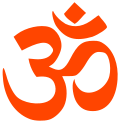Devata
| Part of a series on |
| Hinduism |
|---|
 |
Devata (pl: devatas, meaning 'the gods') (Devanagari: देवता; Khmer: ទេវតា (tevoda); Thai: เทวดา (RTGS: thewada); Balinese, Sundanese, Malay: dewata; Javanese: déwata or jawata;[1] Batak languages: debata (Toba), dibata (Karo), naibata (Simalungun); diwata (Philippine languages)) are smaller and more focused Devas (Deities) in Indian religions, such as Hinduism and Buddhism. The term "devata" itself can also mean deva. They can be either male or female. Every human activity has its devata, its spiritual counterpart or aspect.
Types

There are many kinds of devatas: vanadevatas (forest spirits, perhaps descendants of early nature-spirit cults), gramadevata (village gods), devatas of river crossings, caves, mountains, and so on. For example, in the Konkan region of India, Hindu devatas are often divided into five categories:[2]
- Sthana devatas or local deities, for example, those in certain places of pilgrimage like Nasik, Vithoba in Pandharpur, Krishna at Dwarka, Kali at Kolkata, Mahalakshmi at Kolhapur, Devi Kanya Kumari at Kanyakumari
- Kula devatas or family deities, like Khanderai and Muniandi
- Ishta devatasor chosen deities
- Vastu devatas or Gruha devatas, a class of deities that preside over the house.
Following are some of the important types of Devatas in Sri Lankan Buddhism:
- Bandara Devathavo are devatas of trees, mountains, etc.
- Gambara Devathavo are devatas of the villages
- Graha Devathavo are devatas of planets[3][4]
Scriptures

Some well-known Hindu-Buddhist heavenly beings belong to the group of devatas, such as apsaras or vidhyadaris (female cloud and water spirits) and their male counterparts, the gandharvas (heavenly musicians). Devatas often occur in many Buddhist Jatakas, Hindu epics such as the Ramayana and the Mahabharata and in many other Buddhist holy scriptures. The island of
See also
References
- ^ Tim Balai Bahasa Yogyakarta (2011). Kamus Basa Jawa (Bausastra Jawa). Yogyakarta: Kanisius.
- ^ R.E. Enthoven; A. M. T. Jackson (1915). Folklore Notes, Vol. 2, Konkan. Bombay: British India Press, Mazgaon.
- ^ "Who are Gods & Goddesses". Why Do I Meditate?. Retrieved 2021-03-18.
- ^ "Sri Lanka Web Portal on Astrology and Spiritual Development". lankawisdom.com. Retrieved 2021-03-18.
- Palani, Sivasiva. "New Angles On Angels." Hinduism Today, Sep 1992. Accessed 11 May 2006.
- Krishna, Nanditha. "Grounded in wisdom." Newindpress on Sunday, April 26, 2003. Accessed 11 May 2006.
- Chopra, Deepak: Life after Death, The Burden of Proof, Chapter 11 "Guides and Messengers" Three Rivers Press, 2008.





